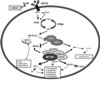Clinical and Laboratory Biomarkers in the Management of Pancreatic Adenocarcinoma
Abstract
Despite improvements in the health service and the available treatment means, the outcome of the majority of patients with advanced pancreatic adenocarcinoma, even in the Western world, is disappointing. This fact necessitates invention and development of clinical and laboratory biomarkers that help us detect early enough those patients who have the worst prognosis, and who may benefit or not from our treatments and individualize thus our management accordingly. In the 2012 American Society of Clinical Oncology (ASCO) Annual Meeting, four interesting scientific works on biomarkers in pancreatic cancer were presented. Two of them presented new clinical data such as the correlation of hand and foot skin reaction with the prognosis of patients treated with capecitabine based treatment (Abstract #4023), and the independent association of early presentation of venous thromboembolic events with poor survival (Abstract #4037). The other two significant abstracts focused on new potential predictive laboratory biomarkers, such as the association of the baseline levels of serum albumin to benefit from bevacizumab enriched treatment (Abstract #4039) and the likely correlation of high insulin growth factor 1 (IGF-1) tissue expression to better prognosis in patients treated with the IGF-1 receptor monoclonal antibody (mAb) MK-0646 (Abstract #4054).
Downloads
References
Moore MJ, Goldstein D, Hamm J, Figer A, Hecht JR, Gallinger S, et al. Erlotinib plus gemcitabine compared with gemcitabine alone in patients with advanced pancreatic cancer: a phase III trial of the National Cancer Institute of Canada Clinical Trials Group. J Clin Oncol 2007; 25:1960-6.
Strimpakos AS, Syrigos KN, Saif MW. The molecular targets for the diagnosis and treatment of pancreatic cancer. Gut Liver 2010 Dec;4(4):433-49.
Cunningham D, Chau I, Stocken DD, Valle JW, Smith D, Steward W, et al. Phase III randomized comparison of gemcitabine versus gemcitabine plus capecitabine in patients with advanced pancreatic cancer. J Clin Oncol 2009; 27:5513-8.
Boeck S, Vehling-Kaiser U, Waldschmidt D, Kettner E, Marten A, Winkelmann C, et al. Erlotinib 150 mg daily plus chemotherapy in advanced pancreatic cancer: an interim safety analysis of a multicenter, randomized, cross-over phase III trial of the 'Arbeitsgemeinschaft Internistische Onkologie'. Anticancer Drugs 2010 Jan;21(1):94-100.
Haas M, Boeck SH, Laubender RP, Modest DP, Vehling-Kaiser U, Waldschmidt D, et al. Correlation of hand-foot skin reaction (HFS) with treatment efficacy in pancreatic cancer (PC) patients (pts) treated with gemcitabine/capecitabine plus erlotinib: A subgroup analysis from the AIO-PK0104 randomized, cross-over phase III trial in advanced PC. J Clin Oncol 2012; 30(Suppl):Abstract 4023.
Shethia MA, Hegde A, Zhou X, Overman MJ, Vadhan-Raj S. Incidence and characterization of venous thromboembolic events (VTE) in patients with pancreatic cancer: Effect of timing of VTE on survival. J Clin Oncol 2012; 30(Suppl):Abstract 4037.
Martin LK, Geyer SM, Bingman A, Zalupski MM, Bekaii-Saab TS. Baseline albumin (b-alb) as a potential predictive biomarker for the efficacy of bevacizumab (B) therapy (tx) in patients (pts) with advanced pancreas cancer (APCA): A comparative analysis. J Clin Oncol 2012; 30(Suppl):Abstract 4039.
Strimpakos A, Saif MW, Syrigos KN. Pancreatic cancer: from molecular pathogenesis to targeted therapy. Cancer Metastasis Rev 2008 Sep;27(3):495-522.
Dong X, Javle M, Hess KR, Shroff R, Abbruzzese JL, Li D. Insulin-like growth factor axis gene polymorphisms and clinical outcomes in pancreatic cancer. Gastroenterology 2010 Aug;139(2):464-73, 473.
Javle MM, Shroff RT, Varadhachary GR, Wolff RA, Fogelman DR, Bhosale P, et al. Tumor IGF-1 expression as a predictive biomarker for IGF1R-directed therapy in advanced pancreatic cancer (APC). J Clin Oncol 2012; 30(Suppl):Abstract 4054.

Copyright (c) 2014 Alexios S Strimpakos, Kostas N Syrigos, Muhammad W Saif

This work is licensed under a Creative Commons Attribution 4.0 International License.
As a member of Publisher International Linking Association, PILA, iMedPub Group’s JOP follows the Creative Commons Attribution License and Scholars Open Access publishing policies. Journal of the Pancreas is the Council Contributor Member of Council of Science Editors (CSE) and following the CSE slogan Education, Ethics, and Evidence for Editors.